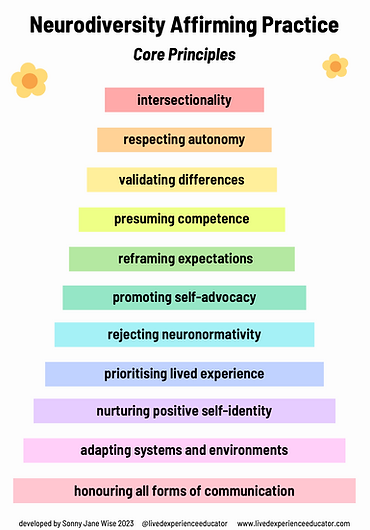
Assessments
Working within the neurodiversity paradigm, I offer speech and language therapy and sensory integration and processing assessments to children (7+), teenagers and adults, including neurodivergent couples and people in the workplace.
In collaboration with the individual and informed by the outcomes they wish to achieve through assessment, we'll work to develop a profile of strengths and support needs in relation to communication and sensory needs.
The goal is to empower individuals with tailored insights that can guide personal growth, educational or workplace adjustments, and more effective, meaningful interactions within their social and professional networks.
A lot of people don't fully understand what a Speech and Language Therapists role is (don't worry, lots of us debate the choice of job role title for the profession when discussing the wide and varying work we can undertake across the lifespan) and, likewise, most often people see Sensory Integration (SI) and Processing as an Occupational Therapists role (which it is, however both SLTs and Physiotherapists can do the same Postgraduate training as OT's, you can find out more about the SLT role and SI, here).
So, if you're wondering how assessment could be helpful, let me give you some examples of what we could focus on understanding further for you:
-
Social communication and reciprocity, e.g., communication style preferences during group socialising, friendship preferences, Double Empathy Problem,
-
Executive Functioning, e.g., organisation, planning, inertia, task paralysis, memory,
-
Emotional Regulation and Processing, e.g., interoception awareness, burnout, energy accounting, language for emotions and behaviour, including alexithymia,
-
Self-Identity work, e.g., understanding own autistic identity and experiences, intersectional identities and neurodivergence
-
Mental Health and Wellbeing, e.g., masking, people pleasing, emotions processing
-
Self-Advocacy, e.g., within the workplace, school, college, University.
-
Understanding Sensory Preferences and Differences, e.g., touch processing, awareness of where the body is in space and tolerance to sounds, like misophonia,
-
Language Processing and Preferences, e.g., Gestalt Language Processing, scripting, logomisia,
-
Expressive Communication Preferences, e.g., mouth-produced language and use of AAC,
-
Mental Capacity, including in relation to Sex and Relationships.
Important Information About Assessment
It is important that you pick the right professionals to work with and therefore, that you take some time to understand how I work. You can find out more about me, my training, approach and values by clicking here.
I have included Sonny J Wise' Neurodiversity Affirming Practice Core Principles infographic because it sums up the commitments and standards I work to.
Assessment is dynamic and takes several sessions together.
It’s important to share that I do not subscribe to historically traditional approaches to supporting autistic people—such as Applied Behaviour Analysis (ABA). That said, I recognise that for some families, especially those navigating systems shaped by racism, classism, or other intersecting oppressions, engaging with these approaches may feel necessary for safety or access.
In line with my commitment to decolonising practice, I avoid using standardised assessments where possible, and instead prioritise dynamic, person-led approaches. I believe this allows me to better support the diverse needs, strengths, and lived realities of autistic and ADHD communities. On occasion, where standardised assessments are required, usually to support access to services such as Education, Health and Care Plans, I will discuss this with the individual and their family.
Adapting Assessments and Reasonable Adjustments
It's important that assessment supports an individual, family or couples communication, sensory, social and executive functioning support needs, and as such, I'm happy to work creatively to complete assessment.
Whilst not exhaustive, some of the ways we can flex and adapt assessment include:
-
Video calls with cameras off,
-
Video calls using closed captions to aid auditory processing,
-
Utilising asynchronous communication methods, which delay the responses given and sharing of information between myself and the individual, such as, email communication, post it notes,
-
The individual bringing a trusted person, pet or toy to their assessment,
-
Supporting reasonable adjustments within the assessment sessions, such as, the use of Loop noise cancelling earplugs and other sensory fidgets,
-
Walking-based assessments to maximise the benefits of being outdoors and engaging with active proprioception for regulation support,
-
Use of my therapy dog during assessment sessions (upon agreement with the individual and clear understanding of her needs as well as the individual's),
-
Spacing out assessment sessions, or the stages of an assessment (information gathering, assessing strengths and support needs, receiving feedback on assessment outcomes, and thinking ahead to goal setting or making decisions about any therapy session work).
Helpful information
-
Assessments can take place on weekdays, usually Mondays or Fridays, evenings or over the weekend (UK time).
-
They can be facilitated online, usually via Zoom, or in person (for people living within 2 hours of EX17, unless otherwise agreed).
-
Once we decide to work together, I will send you my terms and conditions, consent forms and any other documentation that is required pre-assessment.
-
These are not generic assessments that only take 90 minutes. Fees reflect the fact you're receiving a detailed dual sensory and communication assessment and as such, reflects the experience and time that goes into this process. A quote will be determined based on initial information gathering. Ordinarily, payment will be required before we start working together on the assessment process.
-
I believe that everyone is entitled to good quality services and I understand that for various reasons, at times, people may not have the discretionary funds to cover commissioning a therapist. I adopt the Green Bottle Sliding Scale Method which you can read more about here.
-
It is not necessary for you to have a formal diagnosis of a neurodivergence for us to work together. I work with people who are self-identifying and recognise that accessing an assessment for a diagnosis is not available to all people.

Meet Callie
Callie is a registered therapy dog with Canine Concern. She is 6 years old, loves to chase a ball, roll in the sand, and paddle in the water.
Whilst a very gentle, kind and friendly soul, she isn't too keen on noisy people, or when people tower over her excitedly to greet her. So my top tip, is to bend down to her level and offer her a bum scratch or ear rub because that's a sure way to rapport build with her!




%20Infographic.png)